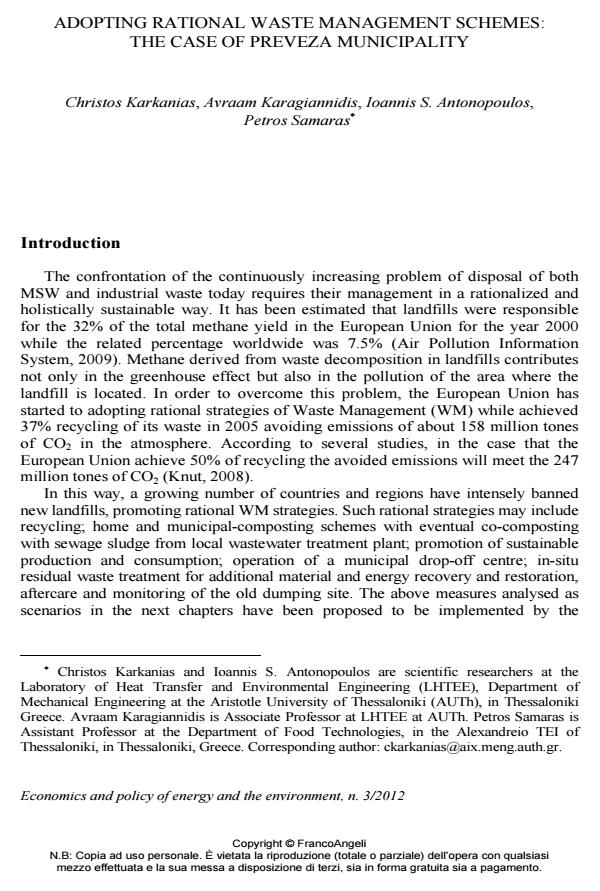Adopting rational waste management schemes: The case of Preveza municipality
Titolo Rivista ECONOMICS AND POLICY OF ENERGY AND THE ENVIRONMENT
Autori/Curatori Christos Karkanias, Avraam Karagiannidis, Ioannis S. Antonopoulos, Petros Samaras
Anno di pubblicazione 2012 Fascicolo 2012/3 Lingua Italiano
Numero pagine 15 P. 65-79 Dimensione file 1103 KB
DOI 10.3280/EFE2012-003006
Il DOI è il codice a barre della proprietà intellettuale: per saperne di più
clicca qui
Qui sotto puoi vedere in anteprima la prima pagina di questo articolo.
Se questo articolo ti interessa, lo puoi acquistare (e scaricare in formato pdf) seguendo le facili indicazioni per acquistare il download credit. Acquista Download Credits per scaricare questo Articolo in formato PDF

FrancoAngeli è membro della Publishers International Linking Association, Inc (PILA)associazione indipendente e non profit per facilitare (attraverso i servizi tecnologici implementati da CrossRef.org) l’accesso degli studiosi ai contenuti digitali nelle pubblicazioni professionali e scientifiche
The amount of both Municipal Solid Waste (MSW) that is landfilled and of the industrial waste illegally dumped is still in high levels in most regions of Greece. Despite a number of measures that have been adopted during the last years, no significant landfill diversion has been achieved. The present study aims at developing an integrated zero-waste management system in order to reduce the amount of MSW delivered for further treatment or landfilling, while utilizing the diverted waste. MSW and industrial symbiosis will be generated by interacting the MSW management and the operating industries while transferring resources from waste management in order to be used in the industry sector. This strategy includes a balanced set of multiple parallel initiatives and measures that will act as drivers of economic activity and sustainable development trough the achieved eco-efficiency. The development of this waste management plan includes the involvement and participation of the general public so as to obtain consensus and achieve a minimum level of common understanding. This study is focused on the municipality of Preveza in the Hellenic region of Epirus and the potential industrial and MSW symbiosis achieved in the area. Multiple scenarios regarding solid waste generation, local management and co-management options, as well as downstream fate regarding the households as well as the companies and enterprises operating in the area were developed for the next two decades. The results of the study have shown the effectiveness and efficiency of the implementation of the selected rational waste management especially these of the recycling scheme. The output for the municipality of Preveza for the next decades will be very positive in terms both of the waste management cost reduction and the elimination of the negative environmental impacts in the greater of the municipality area.;
Keywords:Eco-efficiency, Waste diversion, Recycling, Scenarios analysis, Energy recovery
Jel codes:Q53, Q42
- Life cycle assessment of source separation of biowaste, pay as you throw systems and autonomous composting units in the Municipality of Katerini, Greece A. E. Maragkaki, G. Sabathianakis, G. Litas, A. Poda, C. Tsompanidis, T. Manios, in Journal of Material Cycles and Waste Management /2023 pp.2498
DOI: 10.1007/s10163-023-01708-6 - Life cycle assessment of food waste home composting in Greece Konstadinos Abeliotis, Katia Lasaridi, Christina Chroni, in Toxicological & Environmental Chemistry /2016 pp.1200
DOI: 10.1080/02772248.2015.1074235 - Sustainable Management of Household Biodegradable Waste: Lessons from Home Composting Programmes C. Karkanias, G. Perkoulidis, N. Moussiopoulos, in Waste and Biomass Valorization /2016 pp.659
DOI: 10.1007/s12649-016-9517-1
Christos Karkanias, Avraam Karagiannidis, Ioannis S. Antonopoulos, Petros Samaras, Adopting rational waste management schemes: The case of Preveza municipality in "ECONOMICS AND POLICY OF ENERGY AND THE ENVIRONMENT" 3/2012, pp 65-79, DOI: 10.3280/EFE2012-003006